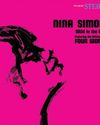
JAZZ EMERGED FROM THE AFRICAN-AMERICAN EXPERIENCE IN THE UNITED STATES, SO IT IS NOT SURPRISING THAT IT HAS BEEN SOCIALLY RELEVANT SINCE ITS EARLIEST MANIFESTATIONS. SONNY ROLLINS PUT THE MATTER SUCCINCTLY: "JAZZ IS PROTEST MUSIC."
In 1923, Bessie Smith sang songs based on her experience of racism and sexism. In 1939, Billie Holiday recorded "Strange Fruit," a chilling song about a lynching. Charles Mingus's 1959 classic "Fables of Faubus" secured a permanent place in music history for the segregationist governor of Arkansas; thanks to Mingus, among jazz fans at least, the name "Orval Faubus" will ever be synonymous with bigotry.
But if social activism is nothing new in jazz, it has never been so prevalent as it is today. At some point in the new millennium, it began to feel like every new jazz album had to have at least one overtly political track. The reasons for this development may lie in the extreme political polarization of our society. The divisiveness of the Trump Era forced everyone, including artists, to choose sides.
This story is from the July 2023 edition of Stereophile.
Start your 7-day Magzter GOLD free trial to access thousands of curated premium stories, and 8,500+ magazines and newspapers.
Already a subscriber ? Sign In
This story is from the July 2023 edition of Stereophile.
Start your 7-day Magzter GOLD free trial to access thousands of curated premium stories, and 8,500+ magazines and newspapers.
Already a subscriber? Sign In

AURAL ROBERT
Another \"outlaw\" country artist

Nina Simone: Wild Is the Wind
By all accounts, Eunice Kathleen Waymon, aka Nina Simone, who passed in 2003, was a troubled person and a brilliant artist. Why she was not more acclaimed during her lifetime is a question several recent film projects have tried to answer. Did her fierce stand on civil rights lose her fans?

Vintage hi-fi, old and new
Many audiophiles and serious music lovers are passionate about vintage. Vintage has become a popular \"way in\" to the hobby, especially popular among younger folks.

Tekton Moab Be
LOUDSPEAKER

ARCAM Radia A25
INTEGRATED AMPLIFIER

Wharfedale Heritage Series 90th Anniversary Dovedale
LOUDSPEAKER

Technics Grand Class SL-1200/1210GR2
RECORD PLAYER

Thrax Audio Siren
Based in Bulgaria, European audio company Thrax has been active since 2009.

EMM Labs MTRS
STEREO POWER AMPLIFIER

SPIN DOCTOR
Alternative phono cartridge technologies and the DS Audio DS-W3 optical cartridge system